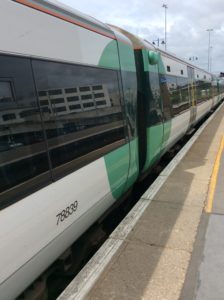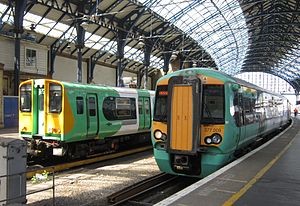Train drivers are to stage a series of one-day strikes and a nine-day ban on overtime next month in a long-running dispute over pay.
The ASLEF union said that the latest walkouts would “ratchet up the pressure” on train companies and the government to give train drivers their first pay rise in more than four years.
Union members will walk out at different train operating companies (TOCs) on different dates with Thameslink drivers scheduled to strike on Sunday 3 December.
Drivers at Southern, the Gatwick Express and Southeastern are expected to walk out on Wednesday 6 December.
GWR drivers are due to go on strike a day later on Thursday 7 December.
All ASLEF members are due to keep to an overtime ban from Friday 1 December to Saturday 9 December.
The union said that it had previously called all its members out on strike on the same day but, by spreading the action, the ramifications for the rail industry would be “greater”.
ASLEF general secretary Mick Whelan said: “We are determined to win this dispute and get a significant pay rise for train drivers who have not had an increase since 2019 while the cost of living, in that time, has soared.
“The Transport Secretary, who has gone missing in action during this dispute, says we should put the offer to our members.
“What the minister apparently fails to understand is that, since the Rail Delivery Group’s (RDG) risible offer in April, we have received overwhelming mandates, on enormous turnouts, for more industrial action.
“Our members have spoken and we know what they think. Every time they vote – and they have voted overwhelmingly – for strike action in pursuit of a proper pay rise, it is a clear rejection of the offer that was made in April.
“The RDG’s offer – a land grab for all our terms and conditions – was made in the full knowledge that it couldn’t – and wouldn’t – be accepted.”
ASLEF said that it had successfully struck pay deals with 14 companies in the past 12 months, including freight firms, open-access operators, Eurostar and passenger companies in Scotland and Wales where transport issues are devolved.
“We have been unable to do a deal with the 16 train operating companies (TOCs) in England controlled by the government. This is a dispute in England made at Westminster by the Tory government.
“We gave the TOCs a way out of this dispute which they chose not to accept because the government interfered.
“We suggested a significant across-the-board increase for all drivers, at all the companies involved, to deal with the ‘cost of living crisis’.
“Other matters, we said, could then be dealt with company by company because terms and conditions are different at each company.
“Uncoupling the carriages, as it were, would have given the TOCs and the government a way out, and given us an opportunity to deal, at company council level, with any changes and productivity they want.

“Some TOCs have Sundays in the working week. Some don’t. One size does not – cannot and will not – fit all.
“We will continue to take industrial action until the train companies – and/or the government – sits down and negotiates with us in good faith.”
ASLEF has held 14 one-day strikes during the 18-month dispute, causing huge disruption to services across the country.
Strikes have also been held since June last year by members of the Rail, Maritime and Transport (RMT) union, who are now voting on a deal aimed at resolving their dispute.
The Rail Delivery Group said: “This wholly unnecessary strike action called by the ASLEF leadership will sadly disrupt customers and businesses ahead of the vital festive period while further damaging the railway at a time when it is still getting an extra is £175 million a month in taxpayer cash.
“The fair and affordable offer made by industry, which would take average driver base salaries for a four-day week from £60,000 to nearly £65,000, remains on the table.
“We urge the ASLEF leadership to put it to its members, give Christmas back to our passengers and end this damaging industrial dispute.”
The Department for Transport said: “It is disappointing that ASLEF are targeting the public and hospitality businesses at the beginning of the festive period when there is a fair and reasonable pay offer for train drivers on the table that would take their salary up to an average of £65,000 for a 35-hour, four-day week.
“Taxpayers contributed £1,000 per household to protect train drivers’ jobs during the pandemic. Instead of going on strike, ASLEF should be following in the footsteps of the other rail unions and giving their members a vote on this fair pay deal.”
The Prime Minister’s official spokesman said: “This is yet another wholly unnecessary act which will only serve to harm the railways and risks further driving passengers away from their services.
“We’ve seen the RMT on train workers say they’ll put their offer to a ballot. ASLEF are becoming more isolated in their approach.”










Wow! A railway strike on the run up to the holidays? Who could have predicted that?
Roll on Ai railway and the casting of the RMT and others into the midden of history.
Have no more patience
Get back to work lads for life
No more public sympathy when xmas plans disrupted. Get back to running a service we can rely on PLEASE.